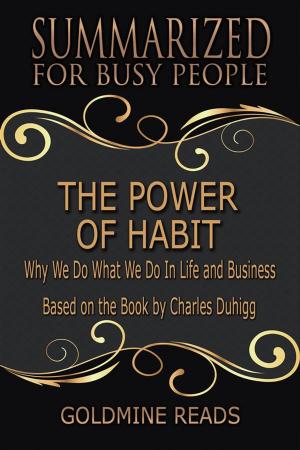Homo Deus - Summarized for Busy People: A Brief History of Tomorrow: Based on the Book by Yuval Noah Harari
Nonfiction, History, Civilization, Science & Nature, Science, Biological Sciences, Evolution| Author: | Goldmine Reads | ISBN: | 9781386071280 |
| Publisher: | Goldmine Reads | Publication: | January 29, 2019 |
| Imprint: | Language: | English |
| Author: | Goldmine Reads |
| ISBN: | 9781386071280 |
| Publisher: | Goldmine Reads |
| Publication: | January 29, 2019 |
| Imprint: | |
| Language: | English |
This book summary and analysis was created for individuals who want to extract the essential contents and are too busy to go through the full version. This book is not intended to replace the original book. Instead, we highly encourage you to buy the full version.
Yuval Noah Harari, author of the worldwide hit and New York Times bestseller Sapiens, presents another riveting and thought-provoking masterpiece revolving around the future of humankind and its journey in the path to divinity.
Throughout the last century, humans have triumphed over the seemingly impossible and have overcome plague, famine, and war. Harari emphasizes that although this is difficult to believe, humankind has indeed successfully reduced plague, famine, and war from unyielding natural forces into manageable predicaments. The fraction of people today that die from communicable diseases is less than of those who die from old age; the mortality rate linked to complications from diabetes, obesity, and heart conditions is less than of those who die from having too little to eat; and the number of casualties of war is less than the total body count for suicide.
A question arises: what will become humankind's next project if not finding solutions for plague, famine, and war? Humans have long reigned over the Earth. Now we must choose our next journey and set on a new path to the future. In Homo Deus, Harari investigates what dreams, nightmares, and ventures await us in the twenty-first century—from surmounting death itself to creating godlike beings.
Now we must ask ourselves: What will become of humankind? With this much power at our fingertips, how will we protect the world from the self-destructive tendencies of man? We are entering the next part of evolution. We have arrived at the age of Homo Deus.
Wait no more, take action and get this book now!
This book summary and analysis was created for individuals who want to extract the essential contents and are too busy to go through the full version. This book is not intended to replace the original book. Instead, we highly encourage you to buy the full version.
Yuval Noah Harari, author of the worldwide hit and New York Times bestseller Sapiens, presents another riveting and thought-provoking masterpiece revolving around the future of humankind and its journey in the path to divinity.
Throughout the last century, humans have triumphed over the seemingly impossible and have overcome plague, famine, and war. Harari emphasizes that although this is difficult to believe, humankind has indeed successfully reduced plague, famine, and war from unyielding natural forces into manageable predicaments. The fraction of people today that die from communicable diseases is less than of those who die from old age; the mortality rate linked to complications from diabetes, obesity, and heart conditions is less than of those who die from having too little to eat; and the number of casualties of war is less than the total body count for suicide.
A question arises: what will become humankind's next project if not finding solutions for plague, famine, and war? Humans have long reigned over the Earth. Now we must choose our next journey and set on a new path to the future. In Homo Deus, Harari investigates what dreams, nightmares, and ventures await us in the twenty-first century—from surmounting death itself to creating godlike beings.
Now we must ask ourselves: What will become of humankind? With this much power at our fingertips, how will we protect the world from the self-destructive tendencies of man? We are entering the next part of evolution. We have arrived at the age of Homo Deus.
Wait no more, take action and get this book now!















